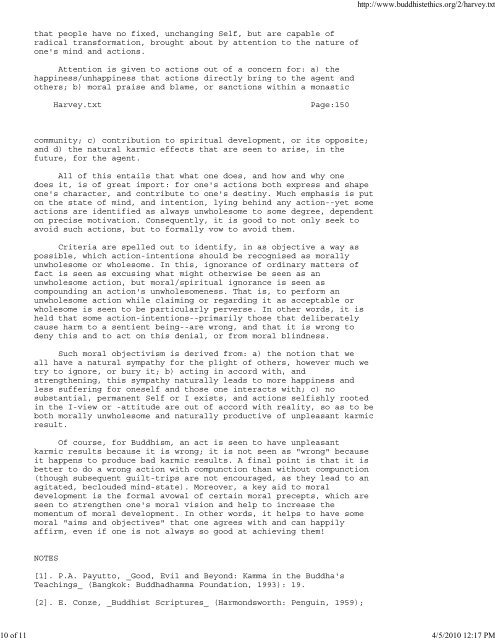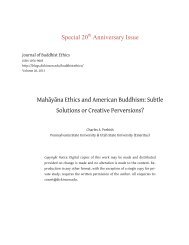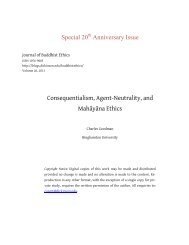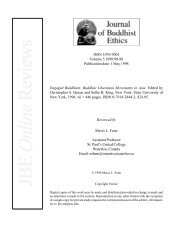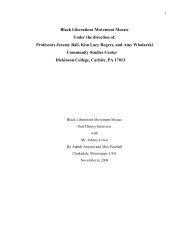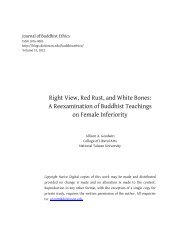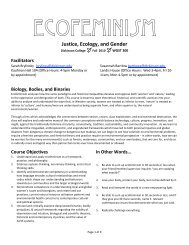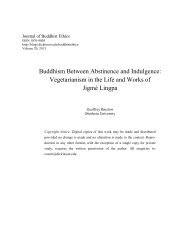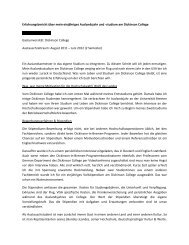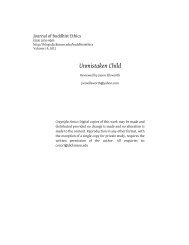Read article - Dickinson Blogs
Read article - Dickinson Blogs
Read article - Dickinson Blogs
Create successful ePaper yourself
Turn your PDF publications into a flip-book with our unique Google optimized e-Paper software.
that people have no fixed, unchanging Self, but are capable of<br />
radical transformation, brought about by attention to the nature of<br />
one's mind and actions.<br />
Attention is given to actions out of a concern for: a) the<br />
happiness/unhappiness that actions directly bring to the agent and<br />
others; b) moral praise and blame, or sanctions within a monastic<br />
Harvey.txt Page:150<br />
community; c) contribution to spiritual development, or its opposite;<br />
and d) the natural karmic effects that are seen to arise, in the<br />
future, for the agent.<br />
All of this entails that what one does, and how and why one<br />
does it, is of great import: for one's actions both express and shape<br />
one's character, and contribute to one's destiny. Much emphasis is put<br />
on the state of mind, and intention, lying behind any action--yet some<br />
actions are identified as always unwholesome to some degree, dependent<br />
on precise motivation. Consequently, it is good to not only seek to<br />
avoid such actions, but to formally vow to avoid them.<br />
Criteria are spelled out to identify, in as objective a way as<br />
possible, which action-intentions should be recognised as morally<br />
unwholesome or wholesome. In this, ignorance of ordinary matters of<br />
fact is seen as excusing what might otherwise be seen as an<br />
unwholesome action, but moral/spiritual ignorance is seen as<br />
compounding an action's unwholesomeness. That is, to perform an<br />
unwholesome action while claiming or regarding it as acceptable or<br />
wholesome is seen to be particularly perverse. In other words, it is<br />
held that some action-intentions--primarily those that deliberately<br />
cause harm to a sentient being--are wrong, and that it is wrong to<br />
deny this and to act on this denial, or from moral blindness.<br />
Such moral objectivism is derived from: a) the notion that we<br />
all have a natural sympathy for the plight of others, however much we<br />
try to ignore, or bury it; b) acting in accord with, and<br />
strengthening, this sympathy naturally leads to more happiness and<br />
less suffering for oneself and those one interacts with; c) no<br />
substantial, permanent Self or I exists, and actions selfishly rooted<br />
in the I-view or -attitude are out of accord with reality, so as to be<br />
both morally unwholesome and naturally productive of unpleasant karmic<br />
result.<br />
Of course, for Buddhism, an act is seen to have unpleasant<br />
karmic results because it is wrong; it is not seen as "wrong" because<br />
it happens to produce bad karmic results. A final point is that it is<br />
better to do a wrong action with compunction than without compunction<br />
(though subsequent guilt-trips are not encouraged, as they lead to an<br />
agitated, beclouded mind-state). Moreover, a key aid to moral<br />
development is the formal avowal of certain moral precepts, which are<br />
seen to strengthen one's moral vision and help to increase the<br />
momentum of moral development. In other words, it helps to have some<br />
moral "aims and objectives" that one agrees with and can happily<br />
affirm, even if one is not always so good at achieving them!<br />
NOTES<br />
[1]. P.A. Payutto, _Good, Evil and Beyond: Kamma in the Buddha's<br />
Teachings_ (Bangkok: Buddhadhamma Foundation, 1993): 19.<br />
[2]. E. Conze, _Buddhist Scriptures_ (Harmondsworth: Penguin, 1959);<br />
http://www.buddhistethics.org/2/harvey.txt<br />
10 of 11 4/5/2010 12:17 PM


